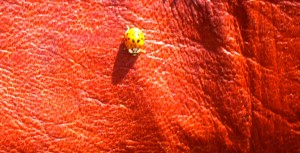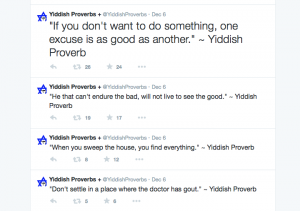Poet Q, Poet A: Six Poets Talk About Jewish "Authenticity," Identity, Mapping & Archetypes in Their Poetry
This is the second installment of Rosebud Ben-Oni’s series of poet-poet conversations in ZEEK, featuring poets Erika Meitner, Eduardo Gabrieloff, Hila Ratzabi, Jason Schneiderman and Emily Jaeger. Future installments include discussions about whiteness and privilege, humor, and more.
Erika Meitner: In my poems, my grandmother appears a lot, partially because she is and was a last link for me to the Holocaust (she survived Auschwitz), to Eastern Europe (she was Polish), to Yiddish (it was her native language), and ultimately to a feeling of “Jewish authenticity” (whatever that means). Do any of your poems struggle with the idea of being “authentically” Jewish? If so, in what ways? Do you find yourself invoking certain tropes or images or sounds as Jewish touchstones, either consciously or unconsciously?
Emily Jaeger: Consciously, I struggle with the label of “Jewish Poet.” For much of my life I chanted Jewish liturgy multiple times a day, studied Bible in university, laughed with friends over the homoerotic poetry of Jewish medieval poets. Judaism is such an intrinsic, obvious part of my life yet I rarely describe specific Jewish experiences or moments in my poetry.
Unconsciously, however, I do invoke my strong connection with Jewish liturgy in my writing. Writing about the Saint Peters Festival or Day of the Dead, my poetic voice slips into the structure biblical parallelism. In my exploration of Paraguayan womanhood, I return to the biblical women. Who were these women, considered barely important enough to be named, yet whose liminal actions drove the stories? My need to write poems which share the generally unheard voice or moment based on the concept of d’mama daka — listening to quiet voice of God’s presence in the world.
Jason Schneiderman: I’ve never felt authentically Jewish, but it doesn’t really worry me.
Rosebud Ben-Oni: Since I’m mixed, with a Mexican mother who converted to Judaism from Catholicism, I have struggled with this idea of authenticity and the Jewish voice. I remember once in college a friend of mine telling me that a classmate who was Modern Orthodox liked my poems a lot, but confided in her that I wasn’t really Jewish because of my mother. It struck me as absurd at that point because here we were in a secular college, where the Jewish student body itself was quite diverse, and yet my classmate could not leave the confines of such a narrow definition. I was a bat mitzvah, and confirmed, and have lived in Israel, but apparently my voice for her and others in her group did not think I accurately reflected a Jewish sensibility.
Years later I am very much less affected by this type of thinking. The doubt in my early poems, especially in the long poem “Shoal” which appears in my book SOLECISM, is very Jewish to me because of its doubt, because of its meandering, because of the images and references that, although not explicit at times, pay tribute to poets like Edmond Jabes who influenced my work early on. I have come to the conclusion there is not one Jewish voice, or one true sensibility, but a multitude that altogether, even if they contradict one another, make up a still evolving Jewish canon.
Hila Ratzabi: I’m really struck by the very few Jewish references in my poems. During college I went through a spiritual journey where I tried to be Jewishly observant in different ways, and studied Hasidism and Kabbalah. This comes out in a group of poems written during and after that time. But since, my connection to that initial spark has slowly disappeared or morphed into something else over time, so has my poetry evolved. It seemed that every poem of mine used to search for God, and then the word no longer had the same power that it used to have for me. But I had to keep writing poems. And I had to keep searching for the thing that is missing that creates the need to write. God will probably always be that thing, regardless of what word I use for it.
Eduardo Gabrieloff: Whenever I specifically mention religion in my poems, it seems to wind up ham-fisted and self-righteous. Angry, but not in an interesting way. But after struggling for years to call myself a poet, a Jew, Latino, queer, an immigrant, etc., I think I’m at a place where I understand that my experience is the authentic experience. Everything I experience becomes something Jews, Latinos, queers, immigrants, etc., experience. My poetry encompasses all those things, and not because I include them in each poem. My poems come from my voice, which cannot be separated from my background.
Emily Jaeger: Do you map your life according to any biblical character, archetype, or ritual?
Rosebud Ben-Oni: I’m fascinated by fallen or tragic characters like Sampson, Cain, Joseph, but I don’t know if I map my life according to their actions. I have a series I’m working on “If ________ the younger sister” in which a female protagonist channels, interrupts, challenges, subverts, misguides these male voices, and retells and resituates these stories in contemporary times, in suspension of space, in different battlefields, in houses uninvited.
Eduardo Gabrieloff: I have been an atheist for nearly 20 years, but I still take the time (when possible with a 4-year-old) to fast on Yom Kippur. I use the day to think about the year I’ve had and to set goals for the coming year. I also review my last year’s goals to see where I wanted to go with my life and where I did go. A lot of my poetry reflects that introspection.
Jason Schneiderman: No.
Erika Meitner: Nope. I really dig some of the tweets @YiddishProverbs though. Why not plan our lives around pithy statements filled with the hard-won dark humor of our people?
Read More
About the Poets
Rosebud Ben-Oni is a CantoMundo Fellow and the author of SOLECISM (Virtual Artists Collective, 2013). Born to a Mexican mother and Jewish father, she was a Rackham Merit Fellow at the University of Michigan where she earned her MFA in Poetry, and was a Horace Goldsmith Scholar at the Hebrew University of Jerusalem. Her work appears or is forthcoming in POETRY, The American Poetry Review, Arts & Letters, Bayou, Puerto del Sol, among others. In Fall 2014, she will be a visiting writer at the University of Texas at Brownsville’s Writers Live Series. Rosebud is an Editorial Advisor for VIDA: Women in Literary Arts.
Erika Meitner is the author of three books of poems — most recently, Makeshift Instructions for Vigilant Girls (Anhinga Press, 2011), and Ideal Cities (Harper Perennial, 2010), which was a 2009 National Poetry Series winner. Her poems have appeared in publications including Best American Poetry 2011, Tin House, jubilat, VQR, and The New Republic. Her newest book, Copia, was just released by BOA Editions in September 2014. Meitner holds an MFA in Creative Writing, as well as an MA in Religious Studies from the University of Virginia, where she was the Morgenstern Fellow in Judaic Studies. She’s currently an associate professor of English at Virginia Tech, where she teaches in the MFA program.
Eduardo Gabrieloff was born in Cali, Colombia. His Colombian mother converted to Judaism when she married his Jewish father, who had come to Colombia after his Uzbek Jewish father married a Syrian Jewish woman he met on a business trip in Brooklyn. Eduardo has been writing poetry since he was 17. His work has been published or is forthcoming from The Journal of Ordinary Thought, Ninth Letter, [PANK], Leaf Litter, and Bluestem. He obtained his MFA from the University of Illinois. He is a Calallo Fellow, a Signal Fire Fellow, and a Canto Mundo Fellow. Eduardo has worked in the nonprofit sector for over a decade and is currently working at the Denver Public Library Friends Foundation.
Hila Ratzabi was selected by Adrienne Rich as a recipient of a National Writers Union Poetry Prize. She is the author of the chapbook The Apparatus of Visible Things (Finishing Line Press). Her poetry is published or forthcoming in The Bloomsbury Anthology of Contemporary Jewish American Poetry, Narrative, Alaska Quarterly Review, Drunken Boat, About Place, The Normal School, H_NGM_N, Cortland Review, and others. She holds an MFA from Sarah Lawrence College, and lives in Philadelphia, where she founded the Red Sofa Salon & Poetry Workshop.
Jason Schneiderman is the author of Sublimation Point, winner of the Richard Snyder Prize from Ashland Poetry Press, and Striking Surface, a Stahlecker selection*from Four Way Books. His poetry and essays have appeared in numerous journals and anthologies, including American Poetry Review, The Best American Poetry, Poetry London, Grand Street, The Penguin Book of the Sonnet, Story Quarterly, and Tin House. Jason has received fellowships from Yaddo, The Fine Arts Work Center, and The Bread Loaf Writers’ Conference. He was the recipient of the Emily Dickinson Award from the Poetry Society of America in 2004, and a finalist for the Eric Hoffer Award in 2011. He is the Poetry Editor of the Bellevue Literary Review, and an Associate Editor at Painted Bride Quarterly. Jason Schneiderman is an Assistant Professor at the Borough of Manhattan Community College, part of the City University of New York.
Emily Jaeger is a Jewish curly-top poet, returned Peace Corps volunteer, and backyard organic farmer who dreams in four languages. Emily served for two years as an agricultural extensionist in rural Paraguay, teaching local farmers sustainable growing practices and leading organic gardening projects. Currently an MFA student at UMASS Boston, she is co-editor and co-founder of the Window Cat Press, a new zine and Tumblr for young, emerging artists. Having completed her undergraduate studies in Bible and Ancient Near Studies at Brandeis University, Emily’s poems draw on Jewish liturgy as well as biblical and ancient Syrian verse. Her current projects include a poetic rendering of informal interviews with rural Paraguayan women. Her work appears or is forthcoming in Cecile’s Writers Magazine, Broadzine, and the Jewish Journal.
Be a Better Reader. Become a ZEEK Supporter Today.
Please consider supporting ZEEK Magazine. Even a small, tax-deductible donation can be a huge help to a small magazine.
![[the current issue of ZEEK]](../../image/2/100/0/5/uploads/leftistethicistgraphic-52842c6a.png)
- 5000 Pages of Zeek
- Founded in 2001, Zeek was the first Jewish online magazine, and we have over 5000 pages online to prove it, all available free of charge. Read more in the Archive.
More articles by
Eduardo Gabrieloff Emily Jaeger Erika MeitnerHila RatzabiRosebud Ben-Oni
More articles in
Arts and Culture
- Euphoria, Curiosity, Exile & the Ongoing Journey of a Hasidic Rebel: A Q & A with Shulem Deen
- Poet Q, Poet A: Jews Are Funny! Six Poets on Jewish Humor, Poetry & Activism and Survival
- Tackling Hate Speech With Textiles: Robin Atlas in New York for Tu B’Shvat
- Fiction: Angels Out of America
- When Is an Acceptance Speech Really a Speech About Acceptance?



